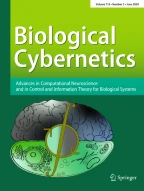Abstract
This paper introduces a theoretical framework for characterizing and classifying simple parallel algorithms and systems with many inputs, for example an array of photoreceptors. The polynomial representation (Taylor series development) of a large class of operators is introduced and its range of validity discussed. The problems involved in the polynomial approximation of systems are also briefly reviewed. Symmetry properties of the input-output map and their implications for the system structure (i.e. its kernels) are studied. Finally, the computational properties of polynomial mappings are characterized.
Similar content being viewed by others
References
Abelson, H.: Computational geometry of linear threshold functions. Inf. Control 34, 66–92 (1977)
Abelson, H.: Towards a theory of local and global in computation. Theor. Comput. Sci. 6, 41–67 (1978)
d'Alessandro, P., Isidori, A., Ruberti, A.: Realization and structure theory of bilinear dynamical systems. SIAM. J. Control 12, 980–996 (1974)
Arnold, V.I.: Representation of continuous functions of three varibles by the superposition of continuous functions of two variables. Am. Math. Soc. Trans., Ser. 2, 28 (1963)
Barrett, J.F.: The use of functionals in the analysis of nonlinear systems. J. Electron. Control 15, 567–615 (1963)
Barrett, J.F.: The series reversion method for solving forced nonlinear differential equations. Mathematica Balkanica 4.5, 43–60 (1974)
Bedrosian, E., Rice, S.O.: The output properties of Volterra systems. Proc. IEEE 59, 1688–1707 (1971)
Berger, M.S.: Nonlinearity and functional analysis. Lectures on nonlinear problems in mathematical analysis. New York, San Francisco, London: Academic Press 1977
Brent, R.P., Kung, H.T.: Fast algorithms for manipulating formal power series. J. ACM 25, 581–595 (1978)
Brilliant, M.B.: Theory of the analysis of nonlinear systems. Tech. Rep. 345 Res. Lab. El. M.I.T. (1959)
Bülthoff, H., Poggio, T., Reichardt, W.: Figure-ground discrimination by relative movement in the visual system of the fly. Part II. Movement and relative movement algorithms. To be submitted to Biol. Cybernetics (1980)
Coleman, B.D.: Finitely convergent learning programs for the separation of sets of shaded figures. Biol. Cybernetics 25, 57–60 (1976)
Coleman, B.D., Mizel, V.J.: Generalization of the perceptron convergence theorem. Brain Theory Newsletter 1, 67–68 (1976)
DeSantis, R.M., Porter, W.A.: On the analysis of feedback systems with a polynomic plant. Int. J. Control 21, 159–175 (1975)
Halme, A.: Polynomial operators for nonlinear systems analysis. Dissertation, Helsinki 1972. Acta Polytechnica Scand. M24 (1972)
Halme, A., Orava, J., Blomberg, H.: Polynomial operators in nonlinear systems theory. Int. J. Syst. Sci. 2, 25–47 (1971)
Harper, T.R., Rugh, W.J.: Structural features of factorable Volterra systems. IEEE Trans. Autom. Control 17, 226–228 (1976)
Holtzman, J.M.: Nonlinear system theory. A functional analysis approach. Englewood Cliffs, N.J.: Prentice-Hall 1970
Julesz, B.: Experiments in the visual perception of texture. Sci. Am. 232, 34–44 (1975)
Kohonen, T.: Associative memory. A system-theoretical approach. Berlin, Heidelberg, New York: Springer 1977
Kolmogorov, A.N.: On the representation of continuous functions of several variables by superpositions of continuous functions of one variable and addition (in russian). Dokl. Akad. Nauk SSSR 114, 679–681 (1957); (Am. Math. Soc. Transl. 28, 55–59 (1963)
Marmarelis, P.Z., Marmarelis, V.Z.: Analysis of physiological systems. New York: Plenum Press 1978
McCulloch, W.S., Pitts, W.H.: A logical calculus of ideas immanent in nervous activity. Bull. Math. Biophys 5, 115–133 (1943); New York, London: Plenum Press 1978
Minsky, M., Papert, S.: Perceptrons. An introduction to computational geometry. Cambridge, Mass., London: MIT Press 1969
Palm, G.: On representation and approximation of nonlinear systems. Biol. Cybernetics 31, 119–124 (1978)
Palm, G.: On representation and approximation of nonlinear systems. Part II. Biol. Cybernetics 34, 49–52 (1979)
Palm, G., Poggio, T.: The Volterra representation and the Wiener expansion: validity and pitfalls. SIAM J. Appl. Math. 33, 195–216 (1977a)
Palm, G., Poggio, T.: Wiener-like system identification in physiology. J. Math. Biol. 4, 375–381 (1977b)
Palm, G., Poggio, T.: Stochastic identification methods for nonlinear systems: an extension of the Wiener theory. SIAM J. Appl. Math 34, 524–534 (1978)
Palm, G., Poggio, T.: Discrete system theory (in preparation 1980)
Poggio, T.: On optimal nonlinear associative recall. Biol. Cybernetics 19, 201–209 (1975a)
Poggio, T.: On optimal discrete estimation. In: Proceedings of the 1st Symp. on Testing and Identification of Nonlinear Systems, March 17–20, 1975. McCann, G.D., Marmarelis, P.Z. (eds.), pp. 30–37. California Inst. of Technology 1975b
Poggio, T., Reichardt, W.: Visual control of orientation behaviour in the fly. Q. Rev. Biophys. 9, 377–438 (1976)
Poggio, T., Reichardt, W.: Characterization of nonlinear interactions in the fly's visual system. In: Theoretical developments in neurobiology. Neuroscience research program bulletin. Cambridge, Mass., London: MIT Press 1980 (in press)
Poggio, T., Torre, V.: A Volterra representation for some neuron models. Biol. Cybernetics 27, 113–124 (1977)
Poggio, T., Torre, V.: A new approach to synaptic interactions. In: Theoretical approaches to complex systems. Proceedings, Tübingen, June 11–12, 1977. Heim, R., Palm, G. (eds.), pp. 89–115 (1978)
Prenter, P.H.: A Weierstrass theorem for real separable Hilbert spaces. J. Approx. Theory 3, 341–351 (1970)
Prenter, P.M.: On polynomial operators and equations. In: Nonlinear functional analysis and applications, pp. 361–398. New York, London: Academic Press 1971
Reichardt, W., Poggio, T.: Figure-ground discrimination by relative movement in the visual system of the fly. Part I. Experimental results. Biol. Cybernetics 35, 81–100 (1979)
Torre, V., Poggio, T.: A synaptic mechanism possibly underlying directional selectivity to motion. Proc. R. Soc. London, Ser. B 202, 409–416 (1978)
Uesaka, Y.: Analog perceptrons: on additive representation of functions. Inf. Control 19, 41–65 (1971)
Uesaka, Y.: Analog perceptron: its decomposition and order. Inf. Control 27, 199–217 (1975)
Author information
Authors and Affiliations
Rights and permissions
About this article
Cite this article
Poggio, T., Reichardt, W. On the representation of multi-input systems: Computational properties of polynomial algorithms. Biol. Cybernetics 37, 167–186 (1980). https://doi.org/10.1007/BF00355455
Received:
Issue Date:
DOI: https://doi.org/10.1007/BF00355455
